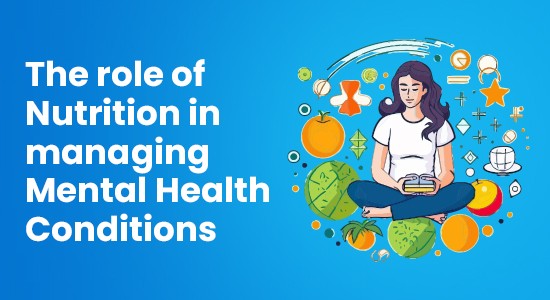The role of nutrition in managing mental health conditions
The role of nutrition in managing mental health conditions
Studies have shown that diet impacts mental health. Nutrition plays a significant role in managing mental health conditions, a strong connectionbetween the foods we eat and our psychological well-being. While nutritionshould not replace proper medical treatment, it can be a valuable complementary approach in promoting mental health.
Here are some ways in which nutrition can impact and contribute to managing mental health conditions:

Brain Function and Neurotransmitters: The brain relies on nutrients toproduce neurotransmitters, which are chemicals that regulate mood, emotions, and cognitive function. For example, serotonin, often referredtoas the “feel-good” neurotransmitter, is synthesized from the amino acidtryptophan, which is found in foods like turkey, dairy products, and nuts. Abalanced diet rich in essential nutrients, including vitamins (such as Bvitamins), minerals (such as zinc and magnesium), and omega-3 fatty acids, can support optimal neurotransmitter production.
Inflammation and Oxidative Stress: Chronic inflammation and oxidativestress have been linked to various mental health conditions, including depression and anxiety. Antioxidant-rich foods, such as fruits, vegetables, and whole grains, can help reduce oxidative stress and inflammation, potentially contributing to better mental health.
Gut-Brain Connection: Research suggests a strong connection betweenthegut and the brain, known as the “gut-brain axis.” The gut microbiota, or thecommunity of microorganisms in the digestive tract, can influence moodand mental health. Consuming a diet high in fiber, prebiotics (which feed
beneficial gut bacteria), and probiotics (found in fermented foods) cansupport a healthy gut microbiome and potentially benefit mental well-being.
Blood Sugar Regulation: Fluctuations in blood sugar levels can affect mood and energy levels. Consuming a balanced diet that includes complexcarbohydrates, protein, and healthy fats can help stabilize blood sugar levelsand prevent drastic mood swings.
Nutrient Deficiencies: Deficiencies in certain nutrients have been linkedtomental health disorders. For example, low levels of vitamin Dhave beenassociated with depression, and deficiencies in B vitamins (such as folateand vitamin B12) have been linked to cognitive impairment and mooddisorders. A varied and nutrient-rich diet can help prevent such deficiencies.
Hydration: Dehydration can negatively impact mood, concentration, andcognitive function. Staying adequately hydrated by drinking water andconsuming hydrating foods (such as fruits and vegetables) is essential for maintaining optimal mental well-being.
Mind-Body Connection: Nutrition can influence overall physical health, which in turn affects mental health. Engaging in a healthy lifestyle that includes regular physical activity and nutritious eating patterns can promotepositive mental well-being.

Here are the top three foods to incorporate into a healthy mental diet:
- Complex carbohydrates — such as brown rice and starchy vegetables cangive you energy. Quinoa, millet, beets and sweet potatoes have more nutritional value and will keep you satisfied longer than the simple carbohydrates found in sugar and candy.
- Lean proteins — also lend energy that allows your body to think and react quickly. Good sources of protein include chicken, meat, fish, eggs, soybeans, nuts and seeds.
- Fatty acids — are crucial for the proper function of your brain and nervous system. You can find them in fish, meat, eggs, nuts and flaxseeds.


